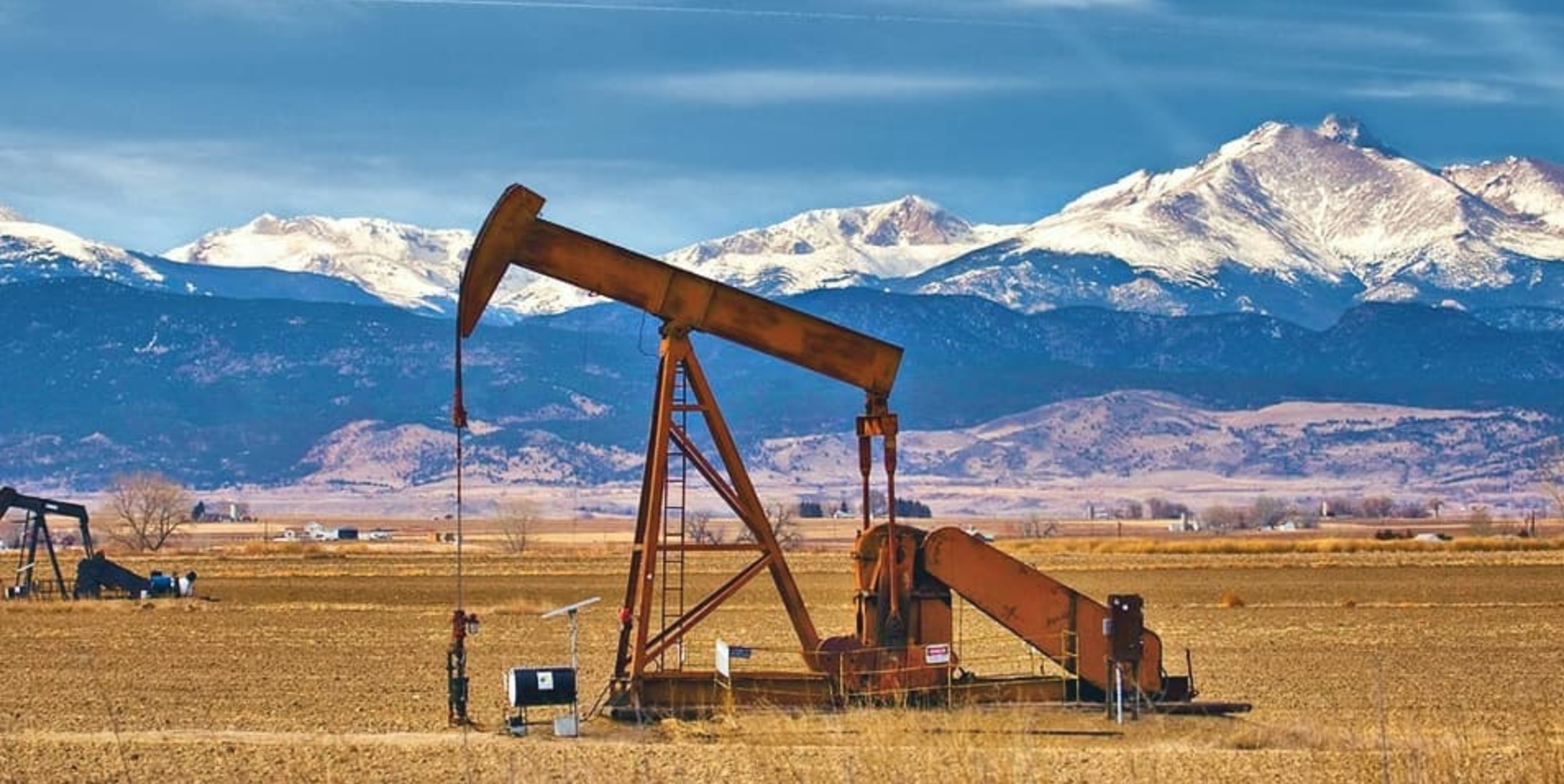Yesterday, President Joe Biden signed into law the Inflation Reduction Act of 2022 (IRA), a wide-ranging bill that, among other things, aims to cut 40% of U.S. CO2 emissions from 2005 levels by 2030.
In a statement released last week, Biden hailed the act as being monumental in addressing the effects of climate change. The Congressional Budget Office estimated the act will generate $739 billion in total revenue.
“This bill also makes the largest investment ever in combatting the existential crisis of climate change,” Biden said in the statement. “It addresses the climate crisis and strengthens our energy security, creating jobs manufacturing solar panels, wind turbines, and electric vehicles in America with American workers.”
The act includes several provisions that concern oil and gas production on federal public lands. Over the past 20 years, Colorado has had the third-highest total number of onshore oil and gas leases considered in effect by the Bureau of Land Management (BLM), behind New Mexico and Wyoming. In 2021, Colorado has 3,245 leases in effect.

Environmental experts and scientists have long agreed that oil and gas production contributes to climate change through the burning of fossil fuels and leakage and other impacts from the extraction process. Outside of the impact producing oil and gas has on the environment, oil and gas operations can also leak dangerous chemicals and are often not held financially accountable for leaking or abandoned oil wells.
The oil and gas provisions included in the IRA are intended to make sure oil and gas companies pay their fair share for their activities and to cut down on harmful emissions that the oil and gas industry produces.
However, environmental groups in Colorado have criticized some of the IRA’s provisions that were added in order to assure passage through the U.S. Senate.
A ‘Perverse Marriage’
To ensure support for the IRA from moderate Democratic senators like Joe Manchin (D-WV) and Kristen Sinema (D-AZ), Democratic Party lawmakers had to make some concessions.
One of those concessions was a move to tie the development of wind or solar energy on federal lands with oil and gas development.
Under the law, in order to grant leases for wind or solar development on federal lands, the Bureau of Land Management is required to have both held an onshore oil and gas lease sale in the previous 120 days and to have offered 2 million acres (or 50% of the acres from leases submitted by the oil and gas industry — whichever is lesser) to oil and gas companies over the past year.
This is one reason that oil and gas companies, in the midst of record-breaking profits through the first half of 2022, are reportedly looking at the IRA as a net positive for their industry. Industry experts are saying that the oil and gas industry should be pleased with the oil and gas provisions in the IRA.
John Horning is the executive director of WildEarth Guardians, a national environmental group said the IRA sacrifices public land protection while locking out indigenous and frontline communities.
“We will never solve the climate crisis by locking in more fossil fuel exploitation and ignoring climate justice,” Horning said in a statement earlier this week. “The fossil fuel industry has spent the past week celebrating this climate bill by suggesting it creates more certainty for them and their bottom line. It is true that this bill will lock in new rules that could open up new oil and gas leasing opportunities for at least another decade.”
Barbara Vazquez, a board member for the environmental advocacy group Colorado Western Alliance and a retired scientist from Cowdrey, Colorado, said that while there is a lot to appreciate in the IRA, the fact that clean energy sources are now explicitly tied to guaranteed oil and gas leasing is extremely concerning.
“We are encouraged that the Inflation Reduction Act holds promising proposals to make long-overdue improvements to our country’s oil and gas program,” Vazquez said. “This is a really perverse marriage. I understand it’s part of the political negotiations but it’s taking us in the wrong direction regarding climate change and a livable environment. That was one we’re really sorry to see.”
Vazquez was honest about her reaction to this specific provision of the IRA, even though she understands that compromise was necessary to get the act passed at all.
“I’m outraged,” Vazquez said. “I’m outraged that we were willing to say yes to that in order to get this through. I’m not a politician. I know there are a lot of really positive programs and funding in this bill that we will all be really grateful for in years to come. But to continue to support fossil fuel development with such a commitment eviscerates the BLM’s opportunity to manage oil and gas leases if they conflict with other important resources.”

Micah Parkin, the executive director of 350 Colorado, another environmental advocacy group, had a similar reaction to the act: appreciative of the progress it marks but aware and concerned about the concessions required to get it passed.
“We’re at a point now where we need to make the transition away from fossil fuels to renewable energy as rapidly as possible,” Parkin said. “It should have happened a couple of decades ago. Action now is absolutely needed if we’re to have any chance of keeping global temperature rise below 1.5 degrees Celsius, which is what countries around the world agreed to as part of the Paris Climate Accord. While we welcome the federal government taking action to address climate change and reduce emissions, the IRA should be amended to remove items that benefit the fossil fuel industry. We really don’t need to be walking in additional fossil fuel development at this point in history. It is the wrong direction entirely.”
‘Long-awaited’ Financial Reforms
The financial reforms in the law that are earning praise from environmentalists are aimed at several unique aspects of oil and gas development on federal lands. One of those reforms was an increase in the royalty rates the federal government charges oil and gas companies to lease lands.
The IRA raises these royalty rates from 12.5% to 16.67% for the 10-year period following the IRA’s passage. The act also raised the royalty rates on reinstated leases from 16.67% to 20%.
Mark Pearson, executive director of the San Juan Citizens Alliance, an organization based in Durango that works to protect public lands in the San Juan Basin and four corners area. The group is based in the San Juan Basin, a significant center for oil and gas production that covers northern parts of New Mexico and southern parts of Colorado.
“There are many long-awaited financial reforms in the act regarding how we administer oil and gas on federal lands in this country,” Pearson said. “This was the first bump in 100 years in royalty rates.”
The IRA also raises the minimum lease bid oil and gas companies can submit for land leases, raises land rental rates on these leases, and establishes an expression of interest fee — which means companies nor have to pay $5 per acre of federal land they are proposing to lease.
These reforms are intended to prevent oil and gas companies from speculative leasing of lands or squatting on federal lands that they are not sure actually produce oil and gas. According to Pearson, this is not as much of an issue in the San Juan Basin because oil and gas producers are more confident in the basin’s ability to produce.
The reforms could have more of an impact in Northwest Colorado, where companies are more likely to take chances on leasing less developed parcels of land, he said.
“The increases in lease rental rates might spur less speculation by the energy industry,” Pearson said. “Similarly, the requirement to now pay $5 per acre to nominate areas for leasing should reduce speculation as well since that’s no longer a freebie to the industry.”

The IRA also eliminates non-competitive leasing, which is when a parcel of land is determined by market forces — meaning there was no interest at public auction to purchase the land — to have little-to-no potential for oil and gas development but is leased by speculators anyway.
“The act eliminates noncompetitive leasing,” Pearson said. “Eliminating that should get rid of a bunch of leases that were sold in the past.”
The IRA also requires royalties on most methane emissions produced from federal leases, including vented gas but not including gas used for on-site activities or for emergencies.
Vented gas, also known as flared gas, is gas released directly from the site into the atmosphere typically in small amounts. But when the sheer number of oil and gas production sites in the U.S. is taken into account, the amount of climate-harming gases released directly into the air is significant.
Before the IRA, there were no royalties on extracted methane or vented gas at production sites on federal lands.
Vazquez said she was pleased with the inclusion of these financial reforms in the IRA as well as the act establishing a methane emission royalty rate, but she did raise a concern about how methane emissions and production data are largely self-reported by the oil and gas companies themselves. This is mostly due to a lack of resources at the state and federal levels to confirm these reports. Colorado alone has over 50,000 active oil and gas wells.
“We depend on the operator to report to the state and to the federal government their production and the disposition of their material they pull out of the ground,” Vazquez said. “We depend on the veracity of the data from operators and I’ve run across issues in the COGCC database where there is no way the data is correct. To the extent that there can be more boots on the ground by both BLM and state inspectors to verify operators’ reports would certainly improve the situation with the royalty that’s imposed. If those numbers aren’t accurate then the royalty is not paid in full.”
RELATED: Oil and Gas Companies Benefit From Tax Breaks in CO
A Permit Reform Side Deal
Reporting about the Senate passing the IRA also included information about a side deal that Manchin struck with Democratic leaders to earn his support. The deal would mark a significant reform in the National Environmental Policy Act (NEPA), specifically concerning the permitting process that energy producers are subject to.
The NEPA was passed in 1970 and requires federal agencies to assess the environmental, social, and economic effects of their proposed actions before making decisions. As part of this process, the public gets to voice their concerns and gets to be kept informed through the permitting process for energy development.
The side deal with Manchin would change how this permitting process would work, accelerating the timeline and leaving less time for environmental review while evaluating whether or not to grant a permit during this time. Renewable energy producers and oil and gas producers alike are subject to this process.
It’s not clear what exactly a reform to NEPA would entail, as the bill is expected to be voted on near the end of September. Vazquez expressed concern with this potential bill.
“We are extremely concerned about a requirement to make unspecified changes to permitting that would undermine the National Environmental Policy Act,” Vazquez said.
Vazquez explained that her criticism of the IRA and this related permitting reform bill is meant to emphasize the dire situation the climate crisis will place humanity in. She said that she does understand the political necessities of the concessions in the act but viewing the entirety of the act — both the good and the bad parts — is a valuable exercise in understanding how much work still needs to be done in addressing climate change.
“It’s a low bar. I can understand the desire to not look at the bad bits,” Vazquez said. “But it’s important we understand what was given away and be vigilant about how this gets implemented and see what we can do to minimize the impact of the really serious concerns I have. Some on the progressive side are excited about this opportunity to speed up the permitting process for renewable energy sources, but be careful what you wish for.”
Reducing Demand for Fossil Fuels
A key aspect of the bill has less to do with directly decreasing the opportunity for oil and gas development, but rather focuses on combatting climate change by decreasing market demand for fossil fuels, according to climate experts.
“The long-term consequence for oil and gas in the [San Juan] basin is the Inflation Reduction Act’s incentive to reduce demand for oil and gas in transportation and electricity generation,” Pearson explained. “A big part of this is targeted at the consumption side of the equation. So, getting people out of their fossil fuel-guzzling vehicles into electric vehicles and shifting electricity from burning coal and natural gas to renewables. It’s getting at oil and gas development from the perspective of decreasing the demand for that use. So hopefully that will translate into less demand for drilling all over our country but also on our local public lands too.”
Heidi Leathwood, 350 Colorado’s climate policy analyst said that while climate change policy should not rely totally on market forces, the IRA is a step in the right direction in Colorado and the nation.
“The oil and gas industry in Colorado will never take responsibility on its own for their part in the climate crisis by reducing their production — they say they are simply filling demand,” Leathwood said. “Even though the IRA contains compromises and giveaways for the oil and gas industry, because it gives money for clean energy, it will jumpstart a move off fossil fuel energy which will reduce that demand for oil and gas. The writing is on the wall. It’s becoming more and more obvious that Colorado can and will transition off fossil fuels. Oil and gas operators in Colorado will have to reduce production because demand will go down not only in Colorado but nationwide (which is where most of their production goes…exported out of state). Colorado should still institute policies to ensure a phaseout, though, because we can’t rely totally on market forces.”
Bonding Rules Cut Out
The original draft of the IRA in the Senate included provisions to establish minimum bonding requirements on new oil and gas leasing projects. Bonding is a process that requires oil and gas developers to provide funding up front for their development projects so that in the case the company goes bankrupt or cannot afford to plug their wells, the state or federal governments do not have to pick up the bill.
This is a big issue in Colorado, which has over 25,000 orphaned or low-producing wells, according to state data. Earlier this year, Colorado passed state rules that set bonding requirements for oil and gas producers.
The final version of the IRA, however, does not include these minimum bonding requirements as the Senate parliamentarian that per reconciliation rules the act could not include bonding reform.
Overall, however, national and local environmental groups seemed pleased with the monumental changes the IRA makes to oil and gas production on federal lands, but are also concerned with the concessions given up in order to pass the act.
Pearson is optimistic that while there is more work ahead for environmental advocacy groups, the bill is a significant moment in humanity’s fight against global warming.
“The refrain that we’ve seen of this being the most significant climate action from the federal government ever is spot-on,” Pearson said. “If this legislation can truly result in a 40% cut in our CO2 emissions over the next decade that would be momentous. It’s going at it from A to Z, we just have to make sure all the ‘A’ things that we like come to fruition and all the ‘Z’ things we’re not so excited about don’t make it.”




